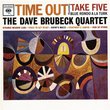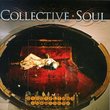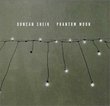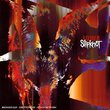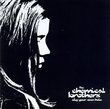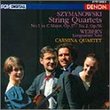| All Artists: Luciano Berio, Peter Eötvös, Göteborgs Symfoniker Title: Berio: Sinfonia; Ekphrasis Members Wishing: 2 Total Copies: 0 Label: Deutsche Grammophon Original Release Date: 1/1/2005 Re-Release Date: 9/13/2005 Genres: Pop, Classical Styles: Vocal Pop, Historical Periods, Modern, 20th, & 21st Century, Symphonies Number of Discs: 1 SwapaCD Credits: 1 UPC: 028947753803 |
Search - Luciano Berio, Peter Eötvös, Göteborgs Symfoniker :: Berio: Sinfonia; Ekphrasis
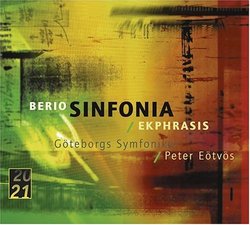 | Luciano Berio, Peter Eötvös, Göteborgs Symfoniker Berio: Sinfonia; Ekphrasis Genres: Pop, Classical
|
Larger Image |
CD DetailsSimilarly Requested CDs
|
CD ReviewsGood, comprable with the famed Boulez recording S. C Rice | 10/18/2005 (5 out of 5 stars) "This recording is a good look at the Berio Sinfonia. I'll compare it to the Erato Boulez recording, which has been the towering recording of the Sinfonia. This recording has the mics closer to the instruments, and more engineering has been done to clarify textures. It is a recording more in the mold of the those that Ensemble Modern has been putting out recently. Eotvos also strives for clarity in this performance- the quotes stand out more, are more articulate, you can hear the interplay of the voices more. I think that the most famous third movement is somewhat more interesting with the more articulate quotations, and the timing of the recitation interacts more directly with other vocalists and the passing quotations. There are other minor details that give the recording some pizzaz here and there. On the downside, the tuning isn't as good in the "o king" movements as it was in the Boulez recording. Overall, I don't know that I like it better than the Boulez recording, but it is a good second interpretation of the piece." Buy This and Buy the Boulez and Let the Fun Begin Zachary A. Hanson | Tallahassee, FL United States | 01/31/2006 (5 out of 5 stars) "This version of _Sinfonia_ more than holds its own. As the reviewer below suggests, it has its charms while the Boulez has its own. I love both versions. This one is sonically crisper; the timbres of the instruments are more dynamic. I like the zaniness of the Swingle Singers on the Boulez recording a little more, though. Still, the recitations are excellent and all-around crisp, too. ***IN CASE YOU DON'T HAVE A KNOWLEDGE OF THIS PIECE--This is a touchstone of the new music with little precedent. It stands at a fascinating crossroads between the compositional techniques of the serialists and the emotion of the Romantics. It is freer in its lyricism than the academic proportions of Schoenberg & Co. The strict serialists did some great things, of course, but what you hear on Sinfonia is what may have happened if more of them let go of the reins in regards to method. In other words, let the madness in without scoring it algebraically. Best part is the third movement, where we hear the words of Beckett like we will hear them nowhere else. Add the fact that the backdrop is a Mahler scherzo played in unnerving "counterpoint" to some post-tonal pulses and you have a visceral, intellectual, and emotionally invigorating experience, indeed. There is no higher recommendation for a piece of new music and this new version pays the spirit of the original a world of tribute." Good, but not the best available. Francisco Yanez Calvino | Santiago de Compostela, GALIZA, Spain. | 06/06/2006 (4 out of 5 stars) "Berio's Sinfonia is one of the most special compositions in the last decades, specially the famous third movement, even all of them are very remarkable because of the use of voice in a quite microtonal way.
In a recent edition of Juxtapositions, we can watch a DVD that has Berio as the central figure of a film on his Sinfonia, specially on the third movement, that he explains in detail on the DVD. His conception of the work is a kind of synthesis much more than a collage, that is what most of the people use to notice in that piece. Berio wanted to do of that movement a kind of personal creed of his debts with music, of those he loved and admired so much, and who have on Mahler the guide, a kind of boat that travels to Cyther full of music inside of his body. Mahler is an example for Berio (like he was for many other composers in the XXth Century, many of them Italian, like Maderna or Nono), and what Berio really loves in Mahler is his great capacity for put together different music, Mahler had on his mind as the conductor of the Vienna Opera he was. Berio tries to do something similar, but not taking the essence of music, like Mahler used to do, but quoting the music itself. In this way, we find on Berio's Sinfonia quotations of Bach, Debussy, Stravinsky, Strauss, Stockhausen, Boulez, Beethoven, Wagner... and of course Mahler... some of the composers he loved and, in my opinion, some of the most important musicians in the history of this art. Eötvös' performance tries to make things very clear, giving special importance to the voices that Berio join to the music in the score, voices that were very present in Boulez's version, that is very close in style to this by Eötvös, even with a very close tempo, that is slower than Chailly (Decca), the performance I really think is the very best. In the Juxtapositions DVD we can here some pieces of the work conducted by Berio, and played by the Concertgebouw, really glorious!!! That performance is the nest I know, even Chailly's one, which is quite perfect is not so amazing like that, probably because it was recorded on Chailly's first years in Amsterdam, when the orchestra was not used to play this kind of contemporary music. Eötvös is really a medium point between Boulez and Chailly, by tempo, by the importance he gives to the different parts of the scores, because of the voices... A good second option, with a good orchestra but not so great like Amsterdam's one. The recording is very good to, but I still prefer Decca's one for Chailly. These are the recordings I know and the ranking I rate nowadays: Chailly (Decca). Eötvös (DG). Boulez (Erato / Apex). Bychkov (Philips). Ekphrasis (Continuo II) has its best performance on Eötvös hands. I knew this piece on Col legno version, but this is really the best I know, so it's a good reason to by this CD, as it is a good recommendation if you don't have Chailly's one or if you want to listen much more clear the voices or another way of explaining this masterwork. " |

 Track Listings (6) - Disc #1
Track Listings (6) - Disc #1